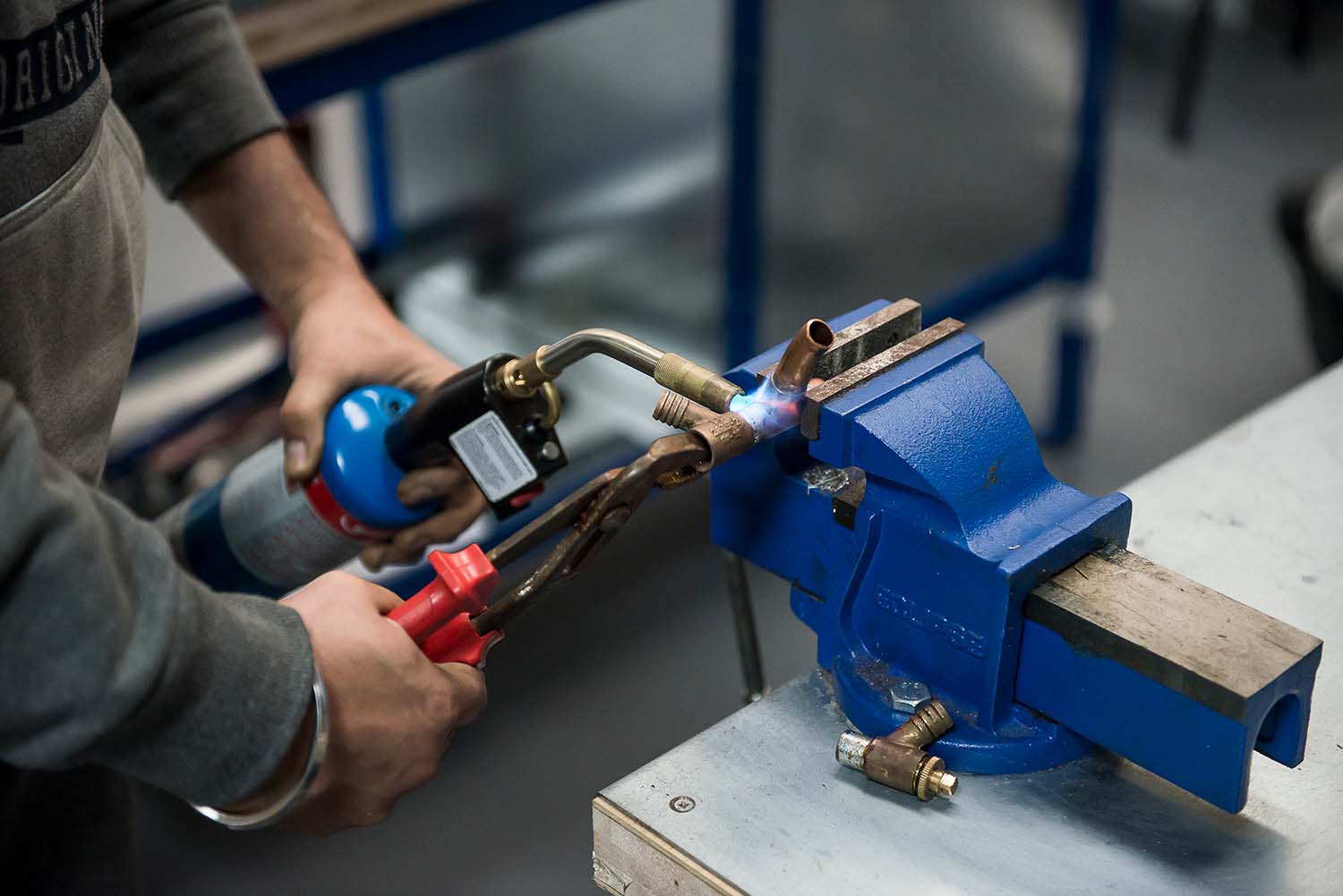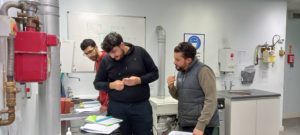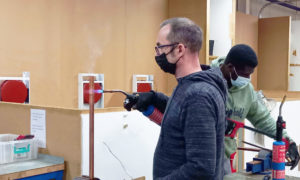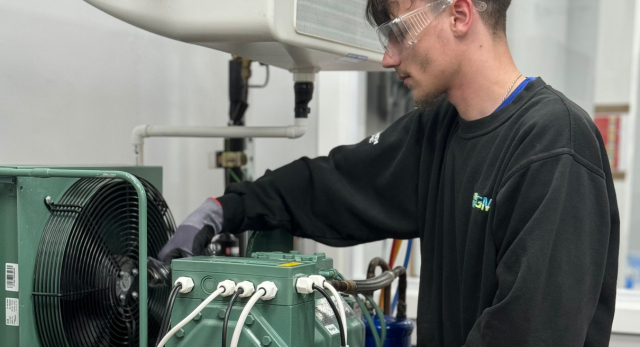A degree is an essential qualification for many careers, such as medicine, nursing and law, however, university is not the only option for school leavers.
Vocational training – training for a specific job – is an alternative pathway to employment for many students; one which also offers the option of higher-level qualification alongside a chance to earn as you learn.
In this blog, we’ll take an in-depth look at the cost, training time, job opportunities and earning potential for school and college leavers entering the domestic gas engineering sector compared to the university route to employment to see which offers the best return-on-investment.
Cost
Gas engineer training:
Plumbing is the ideal starting point for a career in gas engineering, renewables and low-carbon heating installation. We offer several training packages designed specifically to give new entrants to the sector everything they need to hit the ground running with a rewarding career that’s well paid and offers plenty of opportunity for growth and development.
The entry level Bronze package guides learners through a Level 2 Diploma in the Installation and Maintenance of Plumbing and Heating Systems and costs £3,700 plus VAT.
From here, candidates have the option to start working and add further qualifications at a later date, or move straight onto the Silver package which adds an NVQ element. This option enables candidates to legally work on building sites, apply for a JIB Plumbing Skills Card and Approved Plumber Status. The training required to reach this stage costs £4,580 plus VAT.
The Gold and Platinum packages culminate in Gas Safe registration, allowing successful candidates to work as a heating engineer as well as a plumber and cost up to £7,910 plus VAT for 11 weeks of training plus free LCL Awards Air Source Heat Pump training, which can be redeemed at any time.
Is gas engineering training for me?
Candidates will need to have a technical mindset, good maths and problem-solving skills and the ability to use your own initiative and work as part of a team. Training consists of a balanced mix of classroom learning and plenty of time in the workshop, where learners can put the theory to the test on a range of different boiler rigs.
If you are aiming for Gas Safe registration, you must also complete a portfolio of real-life gas boiler installations. You’ll work under the supervision of an experienced engineer to gain the real-world experience and confidence you’ll need once working.
Generally, trainees will need to front the training fees themselves, but finance packages are available to help candidates spread the cost. Crucially, candidates can get out on-the-tools and earning very quickly which ensures any training costs are repaid as quickly as possible.
University:
Universities in England can charge tuition fees of up to £9,250 per year, totalling £27,750 over the course of an average three-year undergraduate degree. Most students will take out a student loan to cover their fees and a maintenance loan to cover their living costs.
The amount of maintenance loan available depends on household income and your living arrangements. For example, for the academic year 2021/2022, students living with their parents can get up to £7,987, but if you are living away from parents in London, you could get up to £12,382 (£9,488 for the rest of the UK).
If you did a three-year course at a cost of £9,250 and got a maintenance loan of £9,488, your degree would cost you £56,214, not including interest of 1.5 – 4.5% – that’s ten times more than the cost of training to work as a gas engineer. A report from the Higher Education Policy Institute found that the average debt of students graduating in 2020 was £45,060.
You won’t start repaying your loan until you earn £524 a week or £2,274 a month (before tax) and the amount paid is 9% of earnings above this threshold. For example, if you earned £30,000 per year in regular monthly payments of £2,500, you would repay around £20.34 per month. Unpaid debt is written off after 30 years.
Training time
Gas engineering training:
One of the great things about training for the skilled trades is that you can start working and earning relatively quickly. Newly qualified plumbers can be on-the-tools within just 6 weeks, choosing to pursue further training and qualifications later which will add interest and increase earning potential.
It can take around 4 – 6 months, including time to build a portfolio of gas work, before trainees are ready to take their ACS assessment for the first time and apply for Gas Safe registration – a legal requirement for working on gas appliances in the UK.
University:
Most undergraduate degrees take 3 years to complete on a full-time basis.
Choosing the university route requires students to dedicate a chunk of their life solely to their studies.
Salary
Gas engineer training:
Once training has been completed, you can expect to work towards a salary that is well above the national average (£31,285 for full-time workers in the UK).
The average salary for a gas engineer is £35,805 per year.
When you first start out, you won’t be at the top of the pay scale, but still you could expect to earn between £20,000 – £25,000 a year. Once you have two years’ experience under your belt, the job market widens and you could be looking to earn anything from £35,000 – £40,000 or more.
The option to do on-call shifts dramatically increases earning potential for domestic gas engineers. This engineer who worked for Pimlico plumbers claimed to earn £210,000 per year working a five-day week and 2 overnight shifts on-call!
University:
Graduate starting salaries range from £16,000 to £90,000 depending on what degree you have and the sector and/or industry you want to work in.
According to the Graduate Outcomes report by the Higher Education Statistics Agency (HESA), the average graduate salary in the UK is around £24,000.
The median salary for graduates in 2020 was around £35,000, up £1,000 from 2019.
Job prospects
Gas engineering training:
Demand for building services engineers is growing fast as the sector responds to the rapidly developing challenge of decarbonisation. Part of this process will involve reducing our reliance on natural gas and moving towards greener alternatives, such as hydrogen and heat pumps.
Those with core qualifications in gas engineering, heating and hot water will become the multi-skilled heating engineers of the future, tasked with delivering low-carbon heating solutions on a mass scale.
In the meantime, there are still 22 million gas boilers in the UK that will need servicing and maintaining and more than 1.6 million new installations each year. But more skilled engineers are desperately needed to meet this demand. Over 50% of Gas Safe registered engineers are over the age of 55 and will be reaching retirement age in the next 5 – 10 years – a critical point for the industry.
University:
In contrast, competition for graduate positions is growing.
A report from the Institute of Student Employers in 2021 revealed that the UK’s largest employers had an average of 91 applications per graduate vacancy, a 17% year-on-year increase and the highest level since records began in 1999.
Additionally, the disruption of the pandemic has led to many students losing jobs or internships, while 28% have had their job offers deferred or rescinded. Concern about future prospects and opportunities has left almost half of students considering further study and 29% considering a career change.
Of course, there are many variables that contribute to how much competition you will face as a new graduate, but it’s no secret that getting the dream job after university can be a challenge.
Career satisfaction
Gas engineering training:
We recently asked installers about their jobs and feelings about the future of the industry. In an industry on the cusp of great change, 71% of installers said they felt a career in domestic gas engineering is a good choice and 83% would recommend it to someone leaving school or college.
Download the full report to find out more about what building services installers think about the future of their industry.
University:
For many students, university offers much more than the degree at the end of it. The chance to move away from home, live independently and meet new people is confidence building and life enriching. Students may have a particular passion or interest they want to pursue and a degree can offer a great foundation for a successful and satisfying working life.
However, university is not the only option for young people and often you do not need a degree to build an engaging and varied career. In one survey, almost half of graduates said they wished they had chosen ‘something more vocational’ instead of a university degree.
Conclusion
It is difficult to make a direct financial comparison between vocational training and university because there are so many variables. While university costs far more than training to be a gas engineer – £46,000 compared to £5,700 – the benefit of the student loan makes the debt more manageable than other types of borrowing.
However, a recent report found that graduates feel their debt is “draining, weighing them down, on their shoulders” and causing them “anxiety, pressure, worry and dread” – something that many young people find off-putting.
With the vocational route, learners can get stuck into their training and become skilled in a specific job and out working and earning within a much shorter period.
Young people who choose gas engineering will be joining a dynamic sector that is playing a huge role in creating a sustainable, low-carbon society. There is plenty of work for gas heating and hot water engineers, with exciting opportunities to upskill to new technologies and fuels.
Could you be the multi-skilled heating engineer of tomorrow?
We offer four gas heating and plumbing packages designed to get new entrants skilled up and ready for work.
Click here to find out more or get in touch with us to discuss your requirements.












